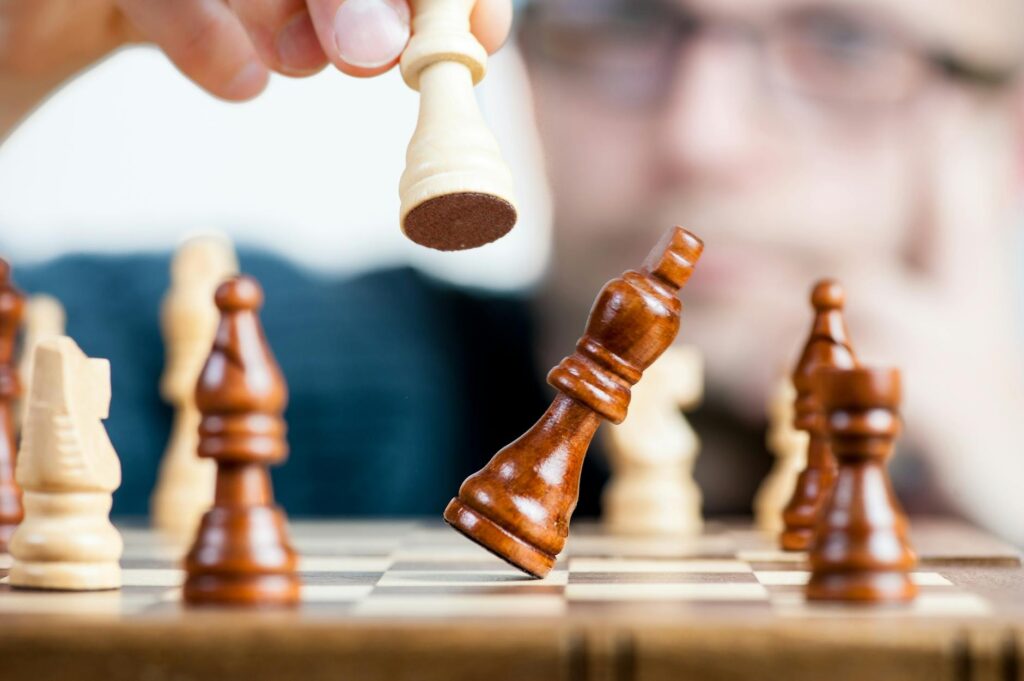Think chess is just a quiet, old-fashioned board game? Think again! That 8×8 grid of black and white squares is actually one of the best brain-training tools out there. From improving your ability to concentrate to sharpening your focus, chess is a powerhouse when it comes to mental fitness. Whether you’re a total beginner or a seasoned pro, every time you sit down to play, you’re giving your mind a serious workout. And guess what? Those skills don’t just stay on the board—they spill over into your everyday life in ways you might not even realize.
How Chess Supercharges Your Brain
Here’s the deal: focus and concentration aren’t just natural talents you either have or don’t. They’re more like muscles. The more you train them, the stronger they get. And that’s where chess comes in. When you play chess, your brain has to juggle a ton of different tasks—planning moves, predicting your opponent’s strategy, remembering past games, and staying focused through it all.
The prefrontal cortex, which is the brain’s command center for decision-making and problem-solving, gets an intense workout every time you play. It’s like brain boot camp! By regularly challenging yourself to think deeply and concentrate during a chess match, you’re teaching your brain how to stay focused on complex tasks in real life too.
Focus or Fail: Why Chess Demands Your Attention
In chess, every single move counts. Seriously, one slip-up and your king is toast. That pressure forces you to concentrate like your life depends on it (okay, maybe not your life, but definitely your pride). You can’t afford to zone out or get distracted because every decision could tip the scales toward victory or defeat.
But here’s the thing: this intense need for focus isn’t just about winning a game. By training yourself to pay attention for extended periods while playing chess, you’re building mental endurance. That means the next time you’re working on a tough project, studying for an exam, or even just trying to get through your to-do list, you’ll find it easier to stay locked in and get the job done.
Patience is a Virtue (and a Focus Booster)
Here’s a truth about chess: you can’t rush it. There’s no fast-forward button or easy shortcut. You have to think, strategize, and wait for the right moment to strike. That kind of patience? It’s a game-changer for your concentration skills.
Learning to be patient in chess helps you build the mental stamina needed to focus on long-term goals, not just quick wins. You get used to the idea that some things take time and that keeping your concentration over the long haul is just as important as short bursts of focus. So, while you’re figuring out how to outmaneuver your opponent on the chessboard, you’re also training yourself to stick with difficult tasks and see them through to the end.
Handling Pressure Like a Chess Pro
Let’s not sugarcoat it—chess can be stressful! Whether you’re playing against a human opponent or battling it out with a computer, there’s always pressure. You’re constantly on edge, trying to avoid mistakes while planning your next move. But here’s the cool part: learning how to keep your cool during a high-stakes chess match can help you manage stress in other areas of your life too.
When you regularly practice staying calm and focused under pressure in chess, you’re actually boosting your ability to concentrate when the stakes are high in real life. Whether it’s keeping your cool in a tense work meeting or staying focused during a chaotic situation, the mental training from chess pays off in big ways.
What Chess Teaches About Avoiding Distractions
In today’s world, distractions are everywhere. From constant notifications on your phone to the endless stream of entertainment at your fingertips, staying focused can feel like an uphill battle. But chess? It’s a no-distraction zone. You can’t afford to let your mind wander when every move is critical.
Playing chess teaches you how to zero in on what’s important and tune out everything else. This laser-like focus can carry over into your daily life, helping you to stay on task even when distractions are pulling at your attention from every direction.
The Takeaway: Chess Sharpens Your Mind
Want a quick list of how chess can boost your focus and concentration? Here’s the lowdown:
- Mental endurance – Chess requires you to focus for long stretches, which builds concentration and stamina.
- Problem-solving – Constantly figuring out strategies and predicting your opponent’s moves sharpens your mind.
- Stress management – Learning to stay calm under pressure in chess translates to better focus in stressful situations.
- Patience and discipline – Chess teaches you that some things take time, improving your ability to stay focused on long-term tasks.
Why Chess is More Than Just a Game
At the end of the day, chess is way more than just a board game. It’s a mental exercise that strengthens your focus, concentration, and overall cognitive abilities. The beauty of it is that you don’t have to be a chess genius to reap the benefits. Whether you’re casually playing with friends or diving into more competitive matches, every game is a chance to sharpen your mind.
Think about it—next time you’re in a chess game, you’re not just plotting how to capture the queen. You’re training your brain to focus better, think deeper, and stay calm under pressure. And those skills? They’ll serve you in all kinds of situations, whether it’s nailing that presentation at work or just handling the ups and downs of daily life.

